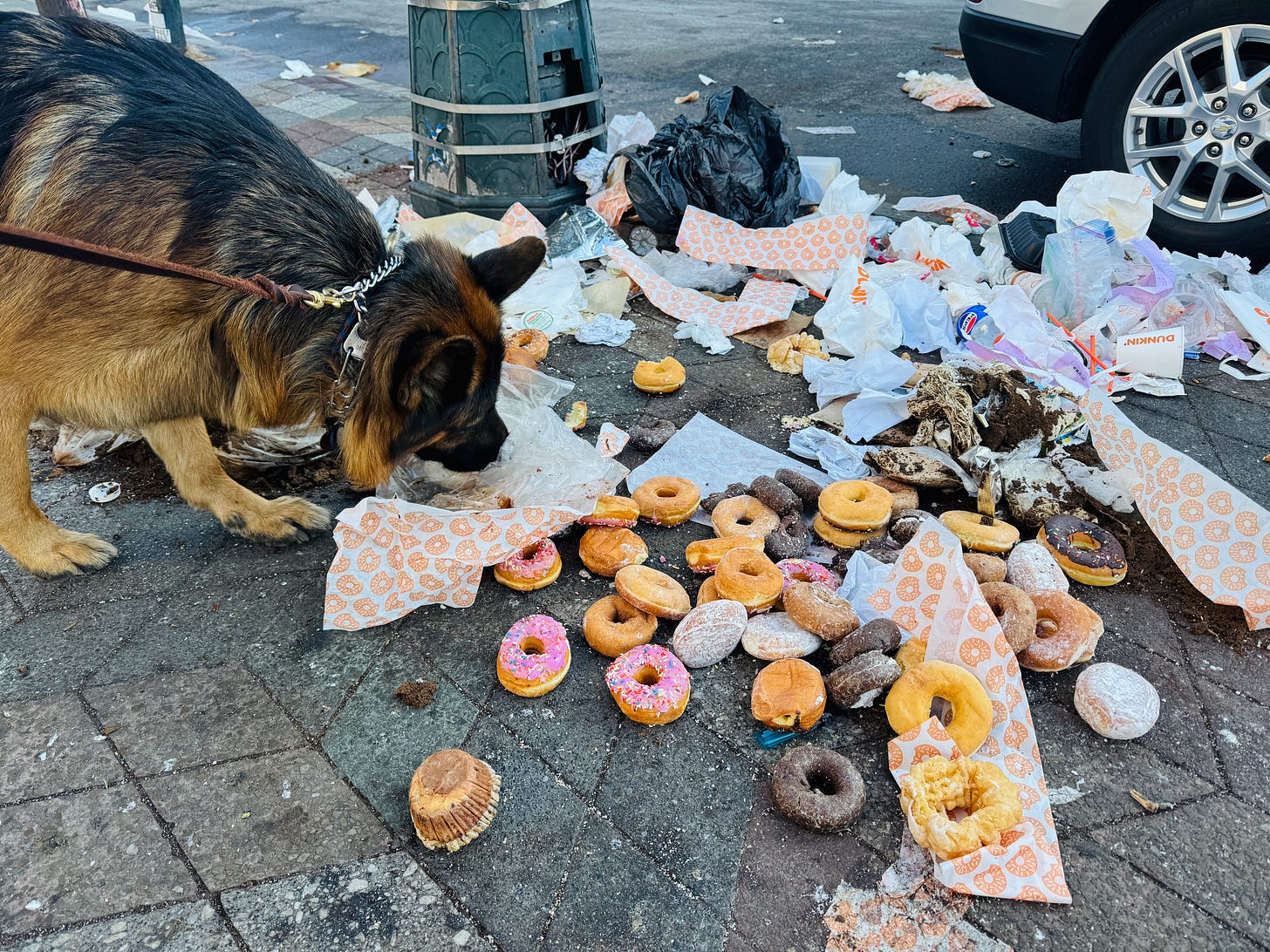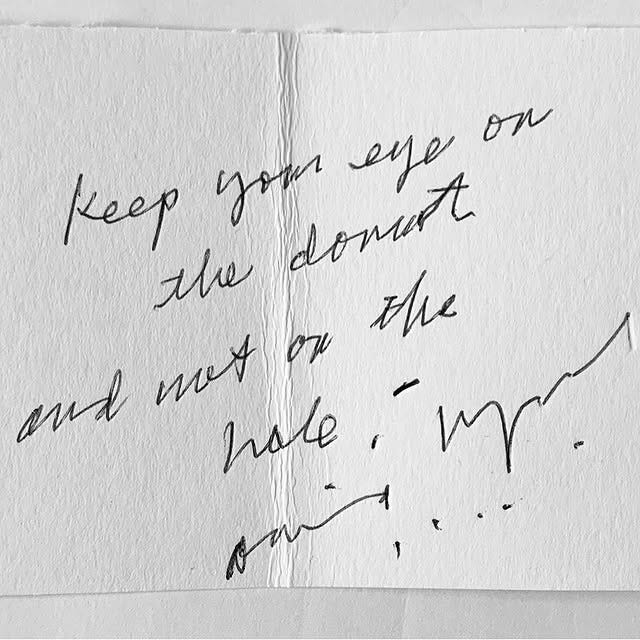🤩 One Hit! Wonder: "I've Already Won"
“Respect the one-hit wonder not for his one hit but for all the days he must have suffered afterward, trying for another.”
—Sarah Manguso, 300 Arguments: Essays
“I will never understand why it is cool to openly mock artists of so-called one-hit wonders; we are talking about people that have brought two and a half minutes worth of pure joy into the world, and that is something that 99.99% of us will never manage.”
—Penn Jillette
I’ve been a dummy lately, unproductively future-tripping about the possibility that each successive book I publish may sell fewer copies than the one before (news flash: they might). It’s not about the numbers, per se, it’s about what they signal for career longevity, visibility, opportunity, and financial viability.
As I’ve shared before, I fell into the trap of treating Free Time (my 2022 book for small business owners) like a child beauty pageant entrant: You have to win and save the family, or we won’t eat! It’s too heavy a burden for a creative project.
I also learned this lesson with my second book, Pivot, which became my greatest publishing success to date, after a solid double (if not triple) with my first, Life After College. None have been grand slams in the viral, bestseller, make-all-the-lists sense, but all three netted exceptional sales and pinch-me opportunities—not to mention what it’s all for: priceless messages from readers sharing how the books positively impacted their lives.
After Free Time fell short of surpassing Pivot sales as my delusional fantasies depicted (selling about a sixth as many copies), I must cop to looking in the rear-view mirror a little too much. What if I never experience results and opportunities quite like that again? Are the biggest ones all behind me?
Thank goodness for smarter, wiser, more successful friends.
I’m in town for a whirlwind trip, any chance you’re free tomorrow morning?
Yes! I replied eagerly, inviting my pal Michael Bungay Stanier (MBS) on a frigid morning outing with Ryder, trekking through the North Woods of Central Park.1 I love spontaneous last-minute invites, and having known MBS for over fifteen years, every chance to connect in person is a treat.
After the walk, as we warmed up over coffee (espresso for him, oat cortado for me, financier for Ryder), I asked him: How do you feel about the idea that your biggest publishing success might already be behind you?
I’ll share his answer in a moment, but first a little background.
MBS’s fourth book, The Coaching Habit, soared through the stratosphere. It’s funny, punchy, and practical—beautifully designed, edited to perfection, and easy for executives to read in one sitting during their flight while traveling for business. The book launched in February 2016 (the same year as Pivot), and now has over fifteen thousand ratings and reviews.
MBS has written three books since, with an eighth launching in just a few short days, a journal called Do Something That Matters (building on his sixth book How to Begin).2
It would be nearly impossible to (re)capture the lightning-in-the-bottle that The Coaching Habit became—and continues to be.
“Most successful books are lucky to sell ten thousand copies in their lifetime,” MBS said. “TCH sells that many every few months.”
The Coaching Habit was rejected three times by his previous traditional publisher. He re-wrote it each time they rejected the manuscript until finally, exasperated, he decided to hybrid publish with Page Two, which would mean more investment up front, but that he’d experience all the upside.
MBS suspects the multiple rejection rounds are partly what ultimately helped the book pack such a powerful punch. It’s like an intricate wood carving; it may look small, but the ideas are big, and he pioneered a new paradigm for business books with the concise format and approach. He has been an inspiration for many authors like me, who go on to experiment with hybrid or self-publishing.3
The Coaching Habit has sold millions of copies and continues generating healthy royalties each month—not to mention yielding tens of millions of dollars in corporate engagements for his company, Box of Crayons.
Thank you rejections!
Over coffee, I mentioned how I naively assumed that “number go up,” after the career-making success of my first two books, especially since I would become more marketing savvy, have more industry connections, and hopefully improve my writing skills with each subsequent effort.
Still, even if I did everything “right” with Free Time (an unlikely assumption), Pivot launched at a different time in the book market, in a very different economy, to a different target audience—and it has a six-year sales leg-up on Free Time.
I mentioned ’s viral 2009 TED Talk, “Your Elusive Creative Genius,” in which she covers the same admittedly champagne-conundrum:4
“I’m pretty young, I’m only about 40 years old. I still have maybe another four decades of work left in me. And it’s exceedingly likely that anything I write from this point forward is going to be judged by the world as the work that came after the freakish success of my last book, right?
I should just put it bluntly, because we’re all sort of friends here now — it’s exceedingly likely that my greatest success is behind me. Jesus, what a thought! That’s the kind of thought that could lead a person to start drinking gin at nine o’clock in the morning, and I don’t want to go there. I would prefer to keep doing this work that I love.”
Gilbert continues the talk with research from other cultures that have “better and saner ideas for managing the inherent emotional risks of creativity.”5
And how do you feel, I asked MBS, knowing that future books you write may never sell even close to as many copies as The Coaching Habit?
“I don’t have any angst about that,” he replied. “I’ve already won. I have so much to be thankful for.”
He referenced how some people talk about one-hit wonders as if it’s a bad thing. “The way I see it, I had a hit!” MBS said. “One in a lifetime is lucky enough. I’ve already won.”
At that moment, I felt the weight of my bad idea balloon lift and float away, up up up out of my head and heart and into the sky.
I’ve already won! Three simple words with such freeing implications.
As we crunched through the dry leaves of Central Park’s North Woods earlier that morning, I asked what he thought about his most recent book launch, six months ago, for How to Work With (Almost) Anyone. It’s doing fine, sales-wise, but MBS said he isn’t obsessing about the numbers. That surprised me, for such a savvy book launcher.
“My main job is to write the next book,” he replied, explaining that it’s not that he won’t put any marketing time and effort into the current one, but his eye is on the bigger picture. No one book becomes his obsession, and the results of any next launch don’t define him. He’s already won. Most of us have, in our own ways.
Just as we emerged from the park, we encountered the following sidewalk scene:
Don’t cry over spilled donuts! I thought as Ryder stole a few licks of frosting.
Our job is only to make the next batch; we can’t control what happens once they leave the shop. Or as the late filmmaker David Lynch—who passed on Wednesday (may he rest in peace)—scribbled on a folded piece of white paper:6
❤️
🎧 Listen to our podcast conversations over the years for Free Time:
And for Pivot:
📓 Pre-order your copy and submit proof-of-purchase here for his bonus bundle, including his the “How to Say No” guide and “My 52 Brilliant Friends’ Best Questions.”
Check out my full Behind-the-Book Spotify playlist, the Author Toolkit, and these three episodes for more on different publishing options:
🔴 Watch ’s TED Talk on YouTube here, “Your elusive creative genius.”
📙 For more on Gilbert’s approach to creativity, partly inspired by the (ironic) popularity of this TED Talk, don’t miss her 2015 book, Big Magic: Creative Living Beyond Fear.
I also highly recommend ’s 2013 book, Daily Rituals: How Artists Work—I’m about to dive back in with a whole new appreciation for the luminaries featured within :)
🍩 Lynch included a version of this in his 2006 book, Catching the Big Fish: Meditation, Consciousness, and Creativity:
“There’s an expression: ‘Keep your eye on the doughnut, not on the hole.’ If you keep your eye on the doughnut and do your work, that’s all you can control. You can’t control any of what’s out there, outside yourself. But you can get inside and do the best you can do.
The world isn’t going to pass you by. There’s no guarantee that meditation or delivering the Wall Street Journal is going to make you a success. But with focus and with meditation—although the events of your outer life may stay the same—the way you go through those events changes and gets so much better.”
👉 If you enjoyed this post, you might also appreciate:













OMG! A pink donut with sprinkles! A sign from God.
Oh thank you for your energizing writing today - a huge fan of MBS I have a little envy in the best way. I am on the fence about writing a second book as my first - while it sold well, more than most - sold only enough to be a problem to future publishing houses (not my words) Thank you for reminding me to write for the message and not for the metrics and money (although those would be lovely too) And if that picture of Ryder isn't a sign for you to write - I'm not sure what would be.